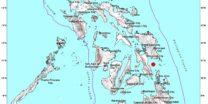GINEBRA’S Justin Brownlee is one of the latest foreign-born people in the country to swear allegiance to the Philippine flag and proudly proclaim “Pinoy Ako!”
Brownlee took his oath to become a full-fledged Filipino on Monday, shortly after steering the gin kings to a PBA championship.
Born in the United States, Brownlee acquired his status as a naturalized Filipino through Republic Act 11937. The President signed this into law on January 12.
The basketball player took one of three routes to become a naturalized citizen of the Philippines.
Naturalized vs natural-born
A naturalized Filipino is one who acquired citizenship by one of several means.
Naturalized Filipinos enjoy all the rights, privileges and prerogatives, as well as the duties and obligations, of Filipinos under the Constitution and the laws of the country.
Natural-born Filipinos are those who are citizens from birth and do not need to do anything to perfect their Philippine citizenship.
Also considered natural-born citizens are those born before January 17, 1973, of Filipino mothers, who elect Philippine citizenship upon reaching the age of majority.
Here are the ways to become a naturalized Filipino:
Legislative route
Congress has the power to pass a measure granting Philippine citizenship to a foreigner, as it did in Brownlee’s case.
Once the President signs this into law, the subject will need to swear allegiance to the Philippine flag and secure a certificate of naturalization from the Bureau of Immigration to enjoy all the rights of a Filipino citizen.
Usually, Congress confers Philippine citizenship on individuals who have made a significant or notable contribution to the country and its people.
Among the individuals who became Filipinos through acts of Congress are American-born basketball player Andray Blatche, Senegal-born basketball player Angelo Kouame, Spanish-born football player Bienvenido Morejon Marañon, and Australia-born businessman Peter Wallace.
Administrative naturalization
Foreigners born and residing in the Philippines may file a petition to be granted Filipino citizenship, as provided for under Republic Act 9139 or the Administrative Naturalization Law of 2000.
They must file the petition before the Special Committee on Naturalization.
To qualify, these foreigners must be at least 18 years old.
They must be able to read, write and speak Filipino or any of the dialects of the Philippines; and must have mingled with Filipinos and shown a desire to learn and embrace their customs and ideals.
The foreigners must also be of good moral character, must believe in the underlying principles of the Constitution, and must have conducted themselves “in a proper and irreproachable manner” during their stay in the country.
They must also have studied in a school that the Department of Education has recognized. And if they have minor children, they must have enrolled them in similar schools.
The applicants must also have a known trade, business, profession or lawful occupation and deriving sufficient income from this.
The foreigners would be disqualified from becoming Filipino citizens if they are opposed to organized government or affiliated with any group who oppose all organized governments.
They will also fail if they are defending or teaching violence or assassination for the success or predominance of their ideas.
Likewise, they will be rejected if they believe in or practice polygamy, and are convicted of crimes involving moral turpitude.
They will be disqualified if they suffer from mental alienation or incurable contagious diseases, and if they failed to show a sincere desire to embrace the Philippines.
Also disqualified from becoming naturalized Filipinos are citizens of countries with whom the Philippines is at war, and countries who do not grant Filipinos the same right to be naturalized citizens.
Upon approval of the petition, the applicant needs to pay P50,000, and then another P50,000 after taking the oath of allegiance.
Judicial naturalization
Foreigners could also file a petition before a competent court to be naturalized as a Filipino.
To qualify for this option, they must have resided in the Philippines for a continuous period of not less than ten years.
The foreigners must be of good moral character and must believe in the principles of the constitution.
They must also have some lucrative trade, profession, or lawful occupation or own real estate worth not less than P5,000.
Moreover, they must be able to speak and write English or Spanish and any one of the principal Philippine languages. They must have also enrolled their children in schools recognized by the country’s education officials and where Philippine history and civics are taught.
The 10-year continuous residency requirement could be reduced to five years if the foreigners filing the petition had honorably held office under the Government of the Philippines.
The residency requirement could also be reduced if the petitioners are married to a Filipino woman; were born in the Philippines; had established a new industry or introduced a useful invention in the Philippines; or had taught in a school that accepts students of different nationalities for not less than two years.
Prior to filing the petition for naturalization, the foreign residents must first file a declaration of intent to become a Filipino citizen.
Those who were born and received their primary and secondary education in the Philippines, and those who have resided continuously in the country for 30 years or more, are spared from this requirement.
The petition for naturalization must be supported by the affidavit of at least two credible Filipino citizens.
Many people can become Filipino at heart, but becoming an actual Filipino citizen will need a few more extra steps.
Banner photo credit: Philippine Senate








